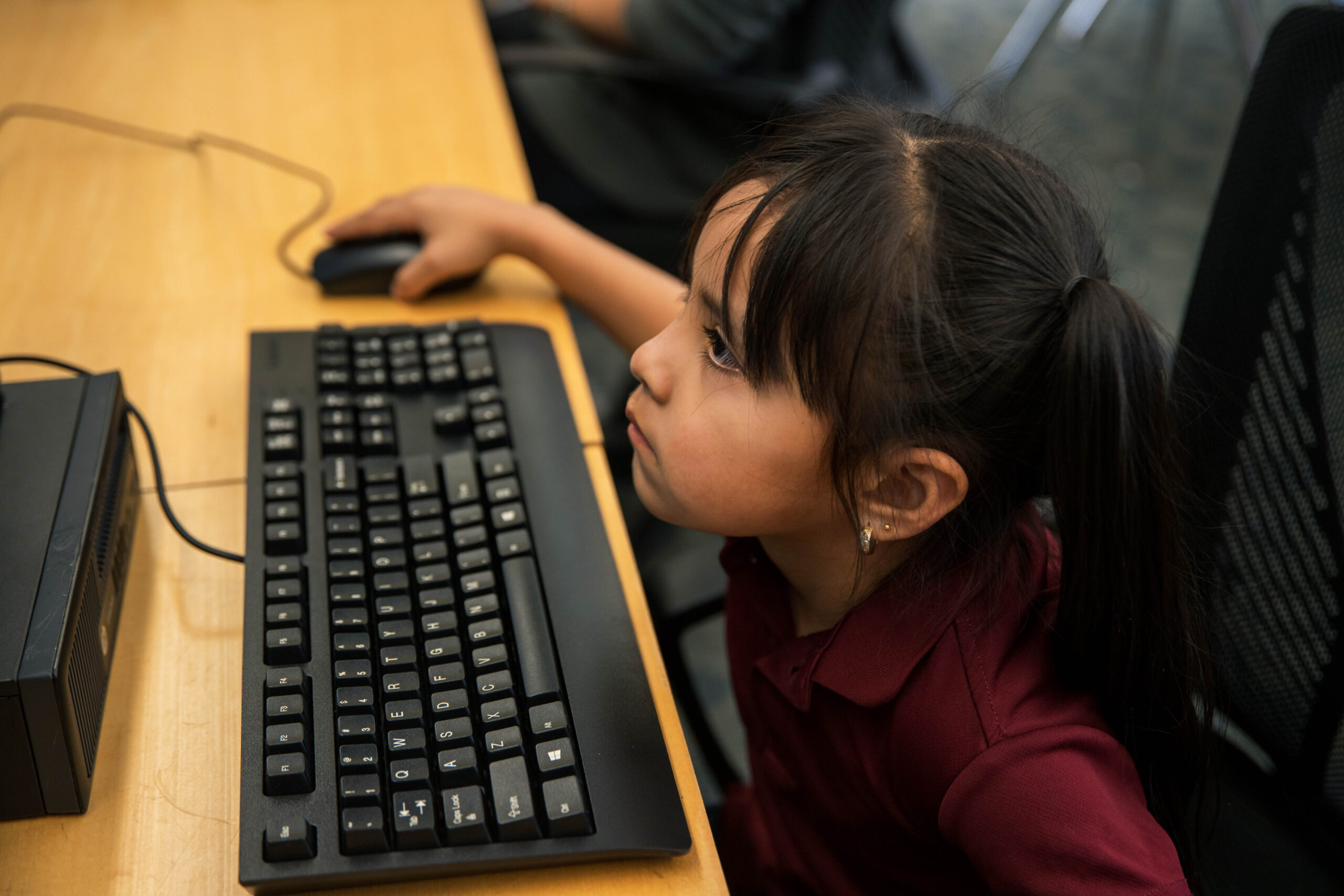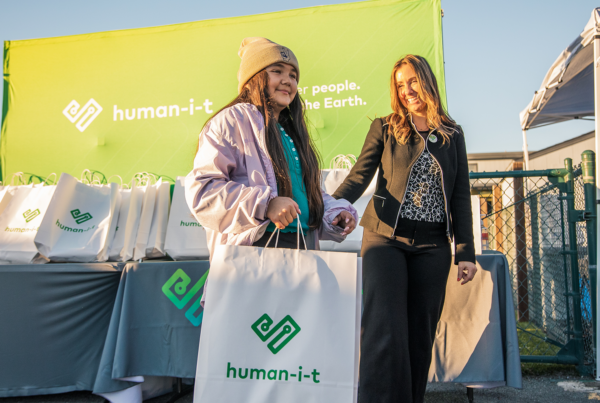Latinos are projected to contribute $3.5 trillion to the U.S. economy by 2026, yet 57% of Hispanic adults don’t own a computer. Let’s sit with that a moment. The fastest-growing workforce demographic in America is being systematically locked out of the digital tools they need to access that economic power.
Hispanic Heritage Month is about celebrating cultural contributions. There’s plenty to celebrate! We also feel it’s a good time to acknowledge the systemic barriers Latino communities still face when trying to get online. At Human-I-T, we refuse to separate celebration from action. That’s why we’ve built bilingual, culturally-responsive solutions designed specifically for Hispanic families navigating impossible choices between rent, food, and internet access.
This Hispanic Heritage Month, we celebrate Latino resilience while confronting an urgent reality: digital inequity threatens the future of millions of Hispanic families. The numbers tell a story that demands more than recognition. They demand change.
Table of Contents
- The Opportunity Gap Holding Latino Communities Back
- Celebrating Contributions While Confronting Barriers
- How We’re Building Digital Equity for Hispanic Families
The Opportunity Gap Holding Latino Communities Back
The infrastructure exists. The technology is available. Yet Latino families keep getting locked out.
Only 57% of Hispanic adults in America own a computer compared to 82% of white adults. And what fills the gap? Smartphones. One in four Latino adults relies solely on their phone for internet access. Try filling out a job application or writing a research paper on a cracked screen with limited data. It’s not impossible, but it’s designed to make you fail.
Affordability drives the divide. Twenty-five percent of Hispanics cite cost as their main barrier to getting online compared to 19% overall.
And let’s talk about Hispanic students. The homework gap devastates Latino students daily. Sixteen percent can’t complete assignments because they lack reliable tech access. They’re four times more likely than white peers to do homework on cellphones or hunt for public WiFi. During the pandemic, many Latino kids did homework in McDonald’s parking lots because that’s where free WiFi reaches. Twenty-eight percent of Hispanic teens worry they’ve fallen behind in school compared to just 11% of white students.
Additionally, Latinos now make up 18% of American workers. They’re a huge part of the future. But 35% of Latino workers lack any digital skills. And 55% have serious gaps in the skills employers demand. When automation comes for jobs — and it’s coming fast — 60% of Latino positions face the highest elimination risk of any group. Despite representing nearly a fifth of the workforce, Latinos hold just 8% of STEM jobs.
All of this is happening now, to families who deserve better.
Celebrating Contributions While Confronting Barriers
Hispanic Heritage Month forces us to hold two truths at once. We celebrate Latino achievements — the entrepreneurs, the educators, the essential workers who kept America running through crisis. And we confront the systemic barriers still blocking millions from reaching their potential.
You can’t do one without the other. Not honestly.
“Being Hispanic, there’s a lot to that,” says Gabe Middleton, co-founder and CEO of Human-I-T. “What’s core to being Hispanic is family, grit, resilience. When I wake up in the morning every day, I know that my heritage is attached to those cornerstones, and I’m ready to attack the world better as a result.”
Those values—family, grit, resilience—are exactly what make the digital divide so devastating.
The New Civil Rights Movement
Digital access has become the civil rights issue of our generation. Just like redlining once determined which families could build wealth through homeownership, we now have digital redlining. It determines which kids can complete homework, which parents can access telehealth, which workers can compete for remote jobs paying livable wages.
The stakes couldn’t be higher. Latino students aren’t just tomorrow’s workforce. They’re half of it. Every teen doing homework on a phone instead of a laptop represents squandered potential. Every parent unable to access job training programs represents lost economic mobility. Without intervention, we’re leaving individuals behind. We’re abandoning entire communities.
Technology races forward while access crawls. AI reshapes entire industries faster than workers can retrain. Automation eliminates jobs at breakneck speed, targeting the exact positions where Latino workers concentrate. The pandemic proved that digital access is no longer optional.
According to UnidosUS, Hispanic and Black communities lag ten years behind white communities in broadband access. A decade. It’s widening with every passing day.
Gabe puts it plainly: “In 2025 and beyond, having access to technology is everything, because opportunity lives online, and if you don’t have access to computer and internet connection, you’re locked out of virtually all modern day opportunities.” He continues, “Many people in the Latino community are not looking for a handout. We just want to ensure that we get access to the same starting line as everybody else, and that’s what access really means.”
But widening gaps can be closed. That’s exactly what we’re built for.
How We’re Building Digital Equity for Hispanic Families
Human-I-T was founded on a belief that shouldn’t be radical: technology access is a right, not a privilege. For many years, we’ve watched Latino families navigate systems designed to exclude them—paperwork in English only, customer service reps who can’t explain billing in Spanish, “affordable” plans that aren’t actually affordable.
So we built something different. Bilingual services aren’t just translated brochures. They’re solutions designed from the ground up for families who’ve been treated like afterthoughts.
Four Pillars That Actually Work
We approach digital equity the way it should work—addressing every barrier at once, not just one piece of the puzzle. Refurbished laptops from brands like Apple and Dell start at $130 because quality matters just as much as affordability. Internet plans run as low as $15 monthly, and we help families navigate subsidy programs without the bureaucratic nightmare. Free digital literacy courses teach skills in English and Spanish — from turning on a computer to writing professional emails.
When something breaks or doesn’t make sense, 24/7 bilingual tech support connects families with actual humans who speak their language. Not automated menus. Not chatbots. People.
Digital navigators sit down with families one-on-one, figure out exactly what they need, and create customized plans that actually work for their lives. Then they follow up. Because real support means sticking around.
And, while he’s not a digital navigator, Ricardo Duran has an important job as well. He works in Human-I-T’s warehouse, refurbishing the devices that become lifelines for families. But he didn’t start out as an employee. “Actually, I came to look for a better program of internet,” he explains. “And definitely I ended up working over here.” Now he’s proud to be part of getting “recycled computers refurbished and sent back to the streets”—back to communities just like his own. It’s the full circle of impact that makes this work different.
Ricardo sees that progress every day in his community. “Being Latino means to me that we can show to everybody that we can progress,” he says. “That we can do better. I’ve been living in this area for around twelve or thirteen years, and I can see the differences.”
That’s what this work is really about—visible, tangible change that builds momentum.
This Hispanic Heritage Month, we celebrate Latino resilience and honor Hispanic contributions to our communities. But celebration without action rings hollow. Human-I-T remains committed to digital equity because when Latino families thrive digitally, entire communities — and our nation — prosper.
Digital equity is about technology, yes. But, more importantly, it’s about dignity, opportunity, and justice. This month and every month, let’s build the future Latino families deserve. Together.






